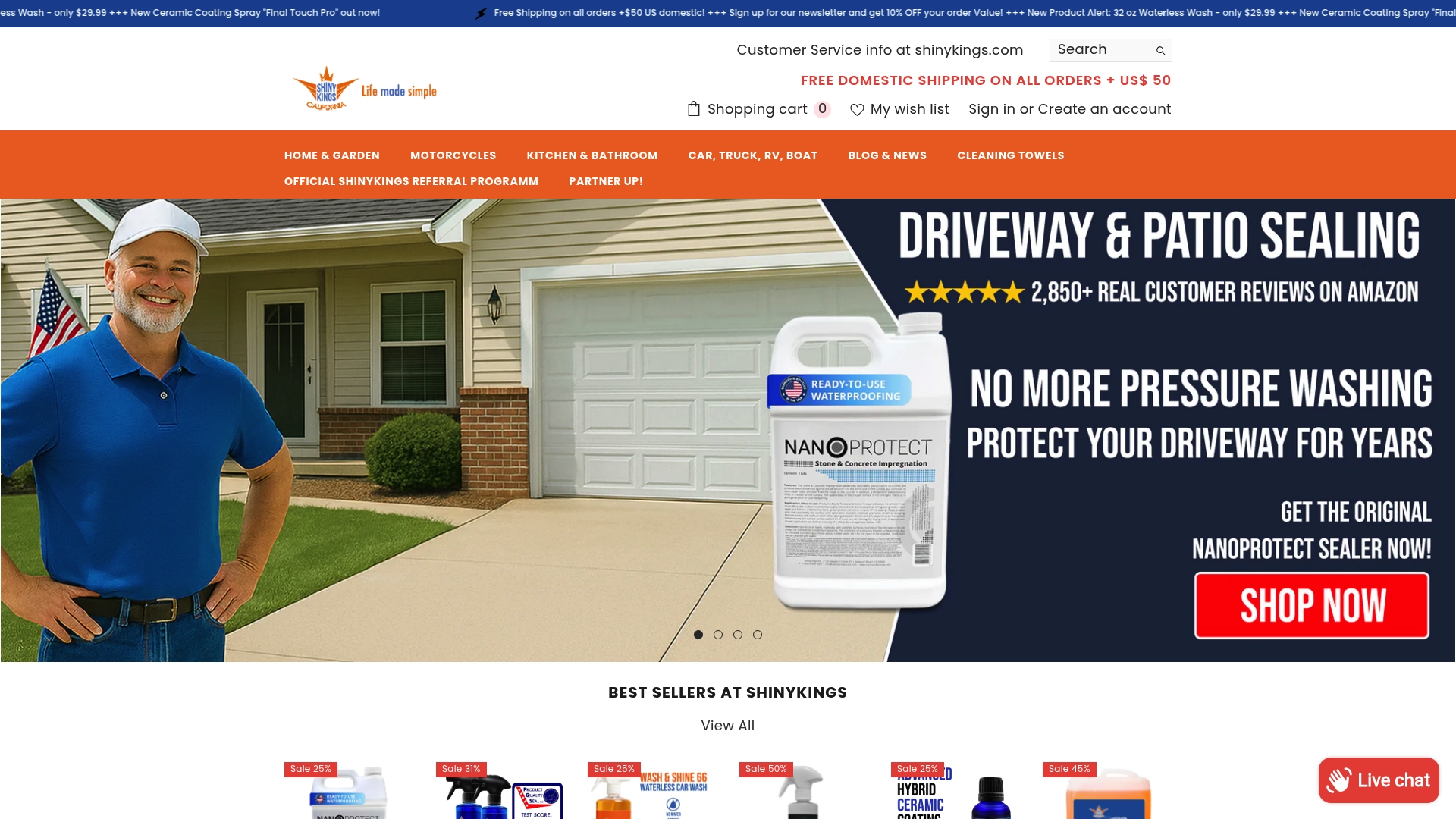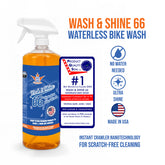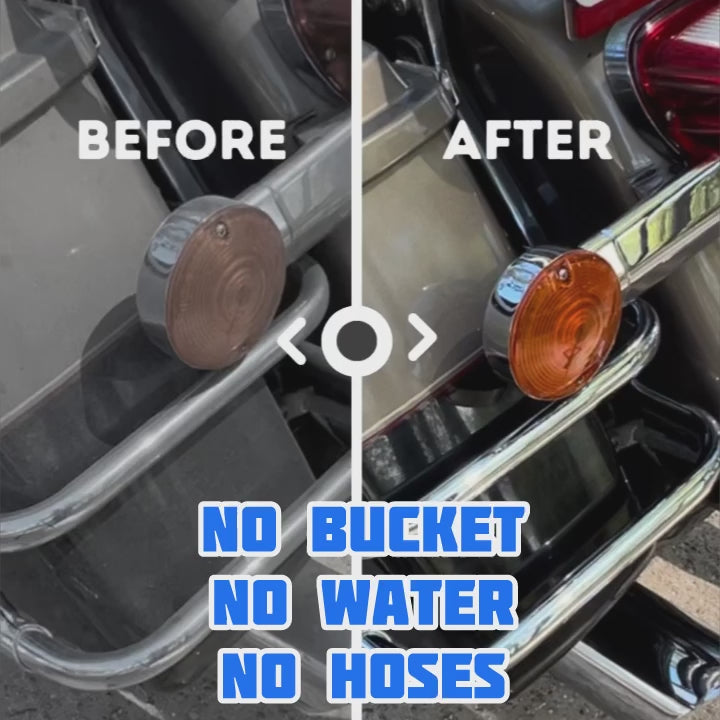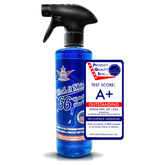Understanding Why Seal Concrete Surfaces Matters
Concrete looks tough on the outside but remains surprisingly vulnerable beneath the surface. Even the strongest slab quickly loses its value when unsealed, with unprotected concrete costing homeowners thousands in preventable damage and repairs. Protecting your concrete starts long before you ever spot a crack and the science behind modern sealing is changing how long your driveway or patio stays clean and solid.
Table of Contents
- What Is Concrete Sealing And Its Purpose?
- The Importance Of Sealing Concrete Surfaces
- How Concrete Sealers Protect Your Investment
- Key Concepts Of Concrete Surface Sealers
Quick Summary
| Takeaway | Explanation |
|---|---|
| Concrete sealing prevents moisture damage. | It creates a barrier that stops water from penetrating the concrete’s surface, reducing deterioration risk. |
| Sealing enhances concrete’s durability and lifespan. | Proper sealing protects against environmental factors, extending the life of driveways, patios, and walkways. |
| Investing in sealants saves money long-term. | Regular sealing can significantly lower repair costs by preventing structural damage from water and chemicals. |
| Sealed surfaces maintain a clean appearance. | The protective layer keeps dirt out and helps maintain the original color and texture of the concrete. |
| Sealers use advanced technology for protection. | Modern sealants penetrate deeply, providing multi-layered defenses against various contaminants. |
What is Concrete Sealing and Its Purpose?
Concrete sealing is a critical protective process that transforms ordinary concrete surfaces into resilient, long-lasting structures resistant to environmental damage. By applying a specialized protective layer, concrete sealing creates an invisible shield that prevents moisture penetration, reduces staining, and significantly extends the lifespan of concrete surfaces like driveways, patios, and walkways.
The Science Behind Concrete Sealing
At its core, concrete sealing works through molecular-level protection. The sealant penetrates the microscopic pores and capillaries within concrete, creating a hydrophobic barrier that repels water, oils, and other potential contaminants. Learn more about advanced concrete protection techniques reveals how modern sealants utilize nanotechnology to provide superior surface defense.
The primary mechanisms of concrete sealing include:
- Blocking Moisture Absorption: Prevents water from entering concrete pores
- Chemical Resistance: Reduces damage from oil, salt, and other corrosive substances
- UV Protection: Minimizes surface degradation from sunlight exposure
Purpose and Long Term Benefits
Concrete surfaces without proper sealing are vulnerable to rapid deterioration. Water infiltration can cause freeze-thaw cycles that create cracks, while unprotected surfaces absorb stains quickly and develop unsightly discoloration. Sealing acts as a proactive maintenance strategy that saves homeowners significant repair and replacement costs over time.
By creating an impermeable layer, concrete sealants provide comprehensive protection against environmental stress, ensuring your surfaces remain clean, structurally sound, and visually appealing for years. The investment in professional-grade sealing represents a smart approach to property maintenance and long-term asset preservation.
The Importance of Sealing Concrete Surfaces
Concrete surfaces represent significant investments in residential and commercial properties, making their protection a critical maintenance strategy. Sealing concrete goes far beyond aesthetic considerations, serving as a proactive defense mechanism against multiple forms of environmental degradation and structural compromise.
Protecting Your Property Investment
Untreated concrete surfaces are highly vulnerable to progressive damage. Water penetration, chemical exposure, and temperature fluctuations can rapidly deteriorate concrete, leading to expensive repairs and premature replacement. Explore our comprehensive concrete protection journey to understand the transformative power of proper surface sealing.
The key protective advantages of concrete sealing include:

- Moisture Resistance: Prevents water absorption and internal structural damage
- Stain Prevention: Creates a barrier against oil, grease, and organic material infiltration
- Enhanced Durability: Reduces surface erosion and extends concrete lifespan
Economic and Aesthetic Benefits
Beyond structural protection, concrete sealing delivers substantial economic advantages. Sealed surfaces require less frequent maintenance, resist color fading, and maintain their original appearance significantly longer than unsealed alternatives. Homeowners can save thousands of dollars in potential repair and replacement costs by investing in professional-grade concrete sealants.
Moreover, sealed concrete surfaces exhibit a cleaner, more uniform appearance. The protective layer prevents dirt accumulation, makes cleaning easier, and maintains the surface’s original color and texture. This not only preserves the property’s visual appeal but also contributes to improved overall property value and aesthetic quality.
This table summarizes the key benefits of concrete sealing as outlined in the article, helping readers quickly identify the primary reasons to seal their surfaces.
| Benefit | Description |
|---|---|
| Moisture Resistance | Prevents water absorption and internal structural damage |
| Stain Prevention | Blocks oil, grease, and organic material infiltration |
| Enhanced Durability | Reduces erosion and extends lifespan |
| Reduced Maintenance | Lowers long-term maintenance needs and repair costs |
| Improved Aesthetic Appearance | Maintains color, resists fading, and keeps surfaces clean |
How Concrete Sealers Protect Your Investment
Concrete surfaces are substantial financial assets that require strategic protection against environmental degradation. Concrete sealers represent a critical line of defense, transforming vulnerable surfaces into resilient structures capable of withstanding extreme conditions and preserving their structural integrity for decades.
Understanding Protective Mechanisms
Modern concrete sealers work through advanced molecular technologies that create comprehensive protective barriers. Discover professional sealing techniques for optimal protection to maximize your concrete surface longevity. These innovative solutions penetrate concrete’s microscopic pores, establishing multi-layered defense systems that block moisture, resist chemical intrusion, and minimize surface degradation.
The strategic investment in concrete sealing provides multiple protective benefits:
- Structural Integrity Preservation: Prevents internal concrete deterioration
- Long Term Cost Reduction: Minimizes expensive repair and replacement expenses
- Surface Performance Enhancement: Maintains original aesthetic and functional qualities
Financial and Functional Advantages
According to the Federal Highway Administration, professional concrete sealing significantly reduces maintenance costs and extends surface lifespan. Homeowners who proactively seal concrete surfaces can expect substantial long-term savings by preventing progressive damage caused by water infiltration, chemical exposure, and temperature fluctuations.
Beyond financial considerations, sealed concrete surfaces demonstrate superior performance across residential and commercial applications. The protective layer acts as a permanent shield, reducing maintenance requirements, resisting staining, and maintaining the surface’s original color and texture. This comprehensive protection ensures that your concrete investment remains visually appealing and structurally sound for many years.

Key Concepts of Concrete Surface Sealers
Concrete surface sealers represent sophisticated protective technologies designed to safeguard and enhance concrete structures. Understanding their fundamental principles enables property owners to make informed decisions about surface protection and maintenance strategies that extend far beyond basic cosmetic considerations.
Types of Concrete Sealers
The concrete sealing landscape encompasses diverse formulation technologies, each engineered to address specific environmental challenges and surface requirements. Explore the nuanced world of solvent-based sealers to understand the intricate chemistry behind advanced concrete protection. Modern sealers generally fall into two primary categories: penetrating sealers and topical sealers, each offering unique protective mechanisms.
Key characteristics of concrete surface sealers include:
- Molecular Penetration: Ability to integrate within concrete’s microscopic structure
- Chemical Composition: Diverse formulations targeting specific environmental challenges
- Performance Durability: Varying longevity and protective capabilities
Performance and Application Principles
Effective concrete sealers operate through sophisticated molecular interactions that create comprehensive protective barriers. These advanced technologies work by either penetrating concrete’s internal structure or forming a protective film on the surface, blocking moisture, resisting chemical intrusion, and preventing environmental degradation.
The scientific principles underlying concrete sealing involve creating hydrophobic barriers that repel water molecules, preventing internal moisture absorption. By blocking potential entry points for damaging substances, sealers significantly reduce the risk of structural compromise, surface erosion, and long-term deterioration. This proactive approach transforms vulnerable concrete surfaces into resilient, high-performance structures capable of withstanding extreme environmental conditions.
Seal Your Concrete Surfaces and Safeguard Your Investment
Your concrete surfaces face real threats from water damage, staining, and everyday wear. As discussed in this article, failing to seal concrete can lead to cracks, discoloration, and costly repairs in the future. Homeowners like you deserve peace of mind and surfaces that stay strong and beautiful. Our expert-developed solutions at Best Concrete Sealers for Outdoor Use are designed to address these exact pain points, giving you advanced protection against the elements.

Take the step now to keep your property looking its best and structurally sound. Visit https://shinykings.com to explore our world-unique concrete sealants and coatings, or see our specialized Long-Lasting Driveway Sealers for Homeowners for targeted driveway solutions. Protect your investment with confidence—your surface deserves it.
Frequently Asked Questions
What is concrete sealing, and why is it important?
Concrete sealing is the process of applying a protective layer to concrete surfaces to prevent moisture penetration, reduce staining, and extend the lifespan of structures such as driveways and patios. It is important as it protects concrete from damage caused by environmental factors and prolongs its durability and aesthetics.
How does applying a concrete sealer enhance durability?
A concrete sealer creates a hydrophobic barrier that repels water, oils, and other contaminants. This prevents water from penetrating the concrete, reducing damage from freeze-thaw cycles, and minimizing surface erosion, thereby enhancing the overall durability of the concrete surface.
Are there different types of concrete sealers, and how do they differ?
Yes, there are primarily two types of concrete sealers: penetrating sealers and topical sealers. Penetrating sealers infiltrate the concrete’s microscopic pores to provide internal protection, while topical sealers form a protective film on the surface. Each type is designed to tackle specific environmental challenges and surface requirements.
The following table compares the two main types of concrete sealers discussed in the article, highlighting their protective mechanisms and ideal applications.
| Sealer Type | Protective Mechanism | Application Method | Best For |
|---|---|---|---|
| Penetrating Sealer | Penetrates concrete pores to provide internal barrier | Absorbed into surface | Long-term, invisible protection |
| Topical Sealer | Forms a protective film on the surface | Applied as a surface coating | Enhanced appearance, easy cleaning |
How can sealing concrete surfaces save money in the long run?
Sealing concrete surfaces reduces the likelihood of damage from water infiltration and chemical exposure, which can lead to costly repairs or replacement. By investing in concrete sealing, property owners can minimize maintenance needs and ensure their concrete remains structurally sound and visually appealing for many years.




